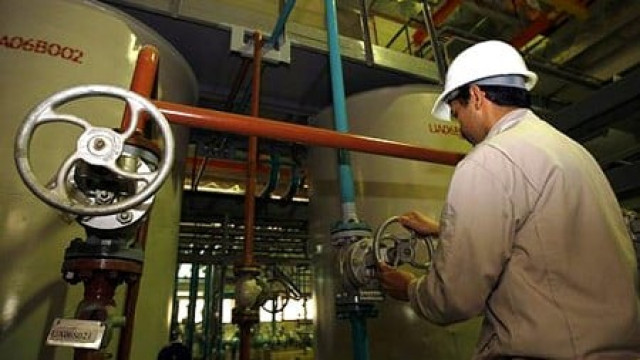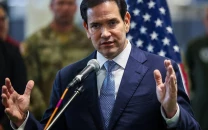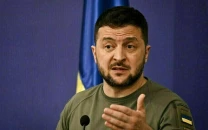Iran, IAEA make progress on nuclear inspections
US says it will judge Iran on its actions, and not just pledges of more inspections, probes.

Yukiya Amano, International Atomic Energy Agency (IAEA) head, said on returning from Tehran on Tuesday that he and Iran's chief nuclear negotiator had made a "decision" to reach an agreement on it probing suspected weapons activities.
Israel and much of the international community fear that Iran's nuclear activities, which have expanded considerably in recent years, are cover for a drive for a weapons capability, something Tehran denies.
Addressing accusations in a major IAEAreport from November that until 2003, and possibly since, Iran did work "relevant to the development of a nuclear explosive device" is a key -- but not the only -- demand of the P5+1.
But contrary to the hopes of some diplomats before he left on Sunday, Amano failed to actually sign a deal, saying at Vienna airport that this would happen "soon" and speaking of remaining "differences."
"At this stage I can say it will be signed quite soon, but I cannot say how soon it will be. In a few days it will be clarified," Amano said.
One Western diplomat told AFP that there had been "no breakthrough." Another said the trip appeared disappointing but that they were waiting for a "clearer picture" at meetings in Vienna later on Tuesday.
Amano's interlocutor Saeed Jalili, who arrived in Baghdad on Monday to head the Iranian delegation, had told him that "the existing differences will not be an obstacle to the agreement," Amano told reporters.
Amano also said that access to the Parchin military site near Tehran, where the IAEAbelieves some weapons work took place -- and which the agency has made a point of seeking to inspect -- would "be addressed" in the mooted road map.
Iran maintains that Parchin is not a designated nuclear site and thus it is not obliged to permit IAEAinspections, although it last did so in 2005. Iran has also rejected Western accusations that it is removing evidence at the site.
The P5+1 hope meanwhile that Iran will agree to a series of steps that can allay, once and for all, suspicions that the Islamic republic wants the bomb, most notably by suspending the enrichment of uranium to 20 percent.
Iran has been enriching uranium for several years to low purities of 3.5 percent that it says is needed for power generation, and since 2010 to 20 percent, which it says is to produce medical isotopes.
But enriching to 20 percent is a significant jump towards 90 percent weapons grade and Iran's ability to do so in theory slashes the "breakout" time needed to create a bomb -- if it decided to do so.
Other ways to build confidence would be Iran shipping its uranium stockpiles abroad, and implementing the additional protocol of the nuclear Non-Proliferation Treaty, which allows for more intrusive IAEAinspections.
But Iran will likely be disappointed if it expects to see sanctions relief in return for any of these moves, with the most it can hope for being a pledge -- with strings attached -- not to impose any more, diplomats said.
The New York Times cited US officials as saying that the P5+1 could offer a package of inducements easing restrictions on items such as aircraft parts or on technical assistance for the energy industry.
In any case, it is far from certain that any firm promises will be made from either side in Baghdad, with one envoy playing down expectations by saying that even if the talks go well, the results might not be "tangible."
Instead, the outcome could be an agreement to hold more regular talks at a working level to thrash out the technical details of confidence-building measures, a process needing two vital and elusive elements: patience and trust.
Israel, meanwhile, widely believed to have nuclear weapons itself, is concerned that the P5+1 might eventually implicitly allow Iran to enrich uranium, when and if Tehran has convinced the P5+1 that it is not up to no good.
"Iran threatens Israel, peace and the entire world. Against this malicious intention, the world's leading countries must show determination, not weakness," Netanyahu said late on Monday.
US will judge Iran on 'actions'
The United States gave a cool reception Tuesday to a mooted deal between the IAEAand Iran, saying the agreement marked a "step forward" but stating that Tehran would be judged on its actions.
"It's important to note that the announcement today is a step forward," White House spokesman Jay Carney said, calling the planned agreement "certainly significant."
However, he added: "We will make judgments about Iran's behavior based on actions."
A key demand of world powers is that Iran address accusations in a major IAEAreport in November that, until 2003, and possibly since, Tehran did work "relevant to the development of a nuclear explosive device."
"This is only a promise, and Iran has made many, many promises in the past," said a third diplomat, adding that Tehran was possibly trying to appear cooperative ahead of Wednesday's meeting in Baghdad.
The US mission in Vienna said that while it appreciated Amano's efforts, it was "concerned by the urgent obligation for Iran to take concrete steps to cooperate fully" with the agency.



















COMMENTS
Comments are moderated and generally will be posted if they are on-topic and not abusive.
For more information, please see our Comments FAQ